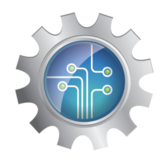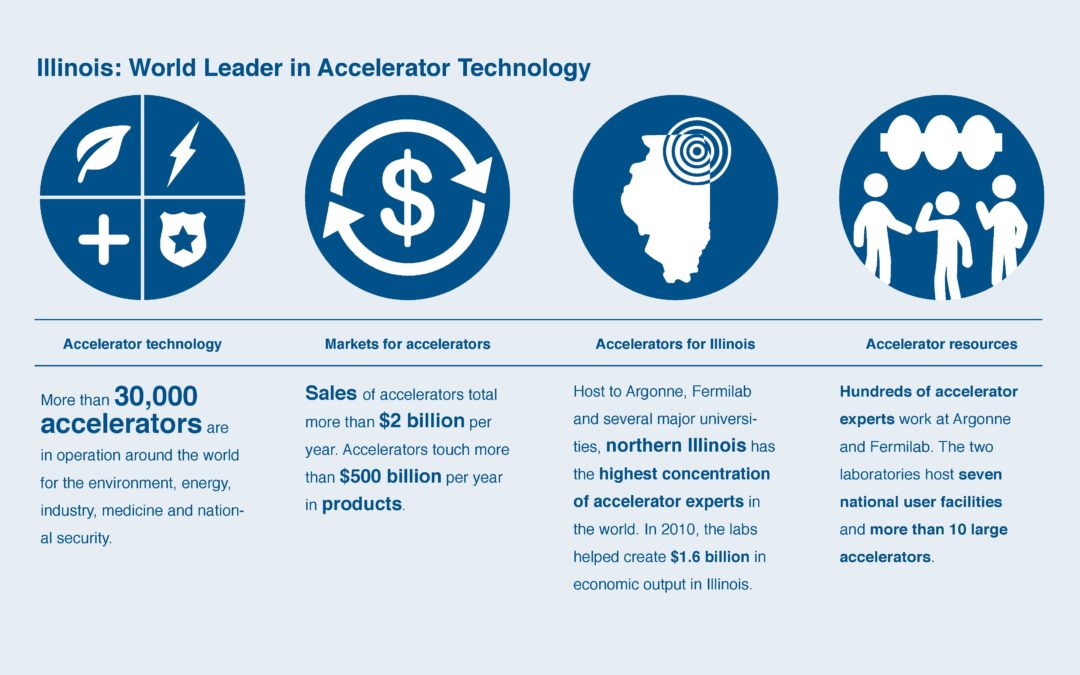By Robert Kephart, Director, Illinois Accelerator Research Center (IARC), Fermilab, and
Cherri J. Schmidt, Manager, Office of Partnerships and Technology Transfer, Fermilab
Argonne National Laboratory (Argonne) and Fermi National Accelerator Laboratory (Fermilab), both located within 30 miles of Chicago, combine to give Northern Illinois the highest concentration of accelerator experts in the world. Accelerators are powerful machines that propel subatomic particles such as protons or electrons to extremely high speeds, in some cases to nearly the speed of light. The resulting particle beam is used as a tool for research and, more recently, for technology commercialization. What was once used almost exclusively to enhance our understanding of the universe can now be harnessed by industry – through initiatives like the U.S. Department of Energy (DOE) Accelerator Stewardship Test-Facility Pilot Program and the Illinois Accelerator Research Center (IARC) – to develop new products that advance economic development by addressing big challenges in energy, healthcare, and sustainable development.
Hundreds of scientists, engineers, and technicians at the two labs operate more than 10 large accelerators that provide a wide array of particle beams for scientific research. Fermilab operates the largest, most powerful accelerator in the western hemisphere, and Argonne’s Advanced Photon Source (APS) is heavily subscribed by users who deliver both basic scientific discovery and applied research, including initial findings that led to AbbVie’s HIV drug, Kaletra®.
The technological impact of accelerator research
The State of Illinois and DOE, the federal agency that oversees the labs, both recognize Illinois’ natural advantages and enormous potential for developing accelerator technology breakthroughs that could change our everyday lives. The technological benefits of accelerator science are well established. Accelerators play a critical role in the manufacturing of automobiles, serve to diagnose and treat medical ailments, and create the semiconductors used in your mobile phone or laptop. Consider the example of MRI magnets. Fermilab worked closely with industry to develop the high-performance superconducting wire for the Tevatron, the world’s highest-energy accelerator during most of its lifetime. Completed in 1983, the Tevatron contained 90 percent of all superconducting wire ever produced. Now the technology is widely used for MRI magnets in hospitals throughout the world.
The outlook for the future of accelerator-based applications is just as exciting. The superconducting-magnet technology developed for high-energy particle accelerators could be translated into higher-power generators for wind turbines, bringing down energy costs. Researchers are already working to develop a mobile accelerator for in situ treatment of asphalt highways to extend their lifetime, saving Illinois taxpayers hundreds of millions of dollars in annual maintenance. Accelerators may also find use in destroying organic contaminants found in industrial wastewater or as tools to sterilize municipal wastewater and sludge, allowing the useful organic compounds to be employed as fertilizer. Accelerators may even find a home in the oil and gas industry in applications that capture natural gas that would otherwise be flared. They can also be used to help upgrade heavy oils so that they can be transported through pipelines. These are just a fraction of the innovations that can be achieved using accelerators.
Building an accelerator hub in Illinois
IARC is a physical space, seeded by State of Illinois funding, to connect Fermilab with industry to transform the lab’s expertise into accelerator-based products and applications, like the ones highlighted above. IARC will also offer unique advanced educational opportunities to a new generation of Illinois engineers and scientists, attracting top scientists from around the world and retaining top talent in Illinois.
The DOE Accelerator Stewardship Test-Facility Pilot Program is one mechanism to catalyze these lab-industry partnerships. Argonne and Fermilab recently hosted the Midwest launch of the program that aims to build awareness of accelerator applications and seed collaborative projects. This is the first of several organized laboratory outreach efforts for accelerator applications. The program brought lab staff together with more than 100 potential partners.
In addition, under various agreements, the laboratory can make its facilities and expertise available to a partner, as well as offer patented and copyrighted lab technology for commercial application. DOE national laboratories may provide short-term technical assistance, conduct research on a partner’s behalf, or more fully collaborate on a project that benefits both parties.
Accelerating connections
The bright prospects for accelerator innovation can be realized only through strong connections between cutting-edge research institutions and forward-thinking members of industry. The benefits go both ways. As Illinois’ national laboratories make their facilities more accessible and as industry partners leverage these opportunities to collaborate, Illinois will emerge as the center of accelerator-driven advances for the nation’s health, wealth and well-being.
Watch and Listen
Particle Accelerators: Current and Future Applications
Technology Development and Commercialization at Argonne
Learn
- Illinois Accelerator Research Center: new accelerator research facility being built at Fermilab
- Report on the DOE Accelerator Stewardship FY 2015 funding opportunity announcement: US Department of Energy/Office of Science
- Argonne Advanced Photon Source: an Office of Science User Facility
- Midwest Accelerator Stewardship Program: a national effort to increase outreach to partners in academia and industry, with the goal of advancing particle accelerator applications
- Accelerators for America’s Future: a source of information on the uses of accelerators for science and society at large
- Accelerators and society: selected examples illustrate long and growing list of beneficial applications with contributions from particle physics
More News
- Students step up with STEM solutions
- Students team up to tackle problems using science, technology, engineering and math
- New group hopes to build on Illinois’ farm, food industries
- The new University of Illinois President: Chicago WTTW
- Cleantech Innovation Bridge connects 16 startups to 3 industry giants
- Clean Jobs IL: An in-depth look at Illinois’ clean energy employment in 2015
- New digital manufacturing complex opens on Goose Island
- New Illinois CIO to tap public, private sector experience
Illinois Innovation Network Featured Resource:
Illinois Innovation Network Featured Resource: Each month, the Illinois Science and Technology Coalition features a service or resource available to innovators and entrepreneurs in the state of Illinois on the Illinois Innovation Network. To learn more and add your resource to the Network, click here.  The Digital Manufacturing and Design Innovation Institute, a federally-funded research and development organization, encourages factories across America to deploy digital manufacturing and design technologies, so those factories can become more efficient and cost-competitive. Continue reading at Illinois Innovation Network
The Digital Manufacturing and Design Innovation Institute, a federally-funded research and development organization, encourages factories across America to deploy digital manufacturing and design technologies, so those factories can become more efficient and cost-competitive. Continue reading at Illinois Innovation Network![]()

